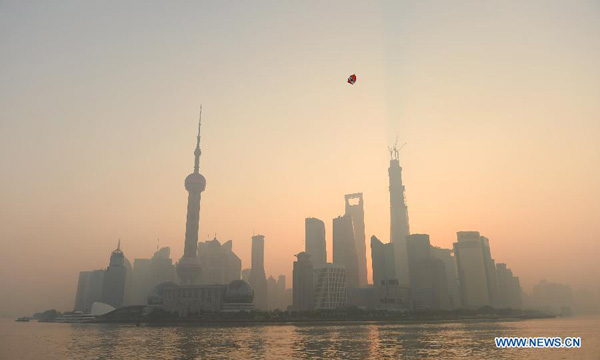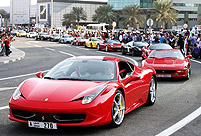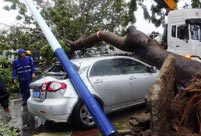 |
| A kite flies over the smog-shrouded Bund area in Shanghai, east China, Nov. 7, 2013. (Xinhua/Lai Xinlin) |
XI'AN, Nov. 20 -- Experts have warned that China's frequent smog may deter overseas Chinese from returning, as the start of the heating season in the north of the country risks worsening the problem.
Many northern Chinese cities officially turned on public heating last Friday, pressurizing the government as it tries to fight smog by reducing consumption of coal.
With the pollution battle entering this make-or-break period, Xinhua spoke to a range of Chinese with both atmospheric expertise and experience of living abroad. They made the gravity of the problem as clear as a blue-sky day.
Lin Yanluan, an associate professor at Tsinghua University's Center for Earth System Science, returned to China in 2012 after 11 years in the United States.
Lin heard about China's air pollution before he returned but never expected it to be so serious. The 40-year-old said, "Many people around me have respiratory diseases that may be related to the air pollution. I hardly ever play basketball outdoors now."
One of Lin's friends in the United States posted a blog to express his concern. "He wanted to return and develop his career, but he was worried the health of his child would be affected by smoggy weather," explained Lin.
As an atmospheric scientist, Lin conducted an experiment proving that large-scale smog lessens atmospheric circulation, leaving the pollution to linger for longer.
"Weather exerts a strong influence on smog. It seems that you only see blue skies in Beijing when there is wind to blow away the smog," he added.
WHAT TO BLAME
Seventy of the 74 Chinese cities monitored by the Ministry of Environmental Protection suffered from air pollution in the third quarter of this year, the ministry announced recently. In the case of 15 of them, more than half the 92 days failed to meet the ministry's atmospheric standards.
Wu Qiong, 26, is an overseas student in Pittsburgh. For her, China's air pollution was rammed home when she compared images of the giant rubber duck artwork that had been touring the world. In Pittsburgh, it floated under white clouds, Wu remembered. But in Beijing, everything was shrouded in grayness.
"My friends and I are concerned with poor air quality in China. Besides job opportunities, it could be said that lingering smog has already become a new factor to consider when overseas Chinese decide whether or not to come back," she said.
Tackling smog has been put on the agenda of Chinese governments at all levels, and has become a hot topic for academic seminars as well as household discussions.
"The causes are various and complicated. We must analyze both sources and dispersion of smog," said Zhao Chuanfeng, a professor at Beijing Normal University's College of Global Change and Earth System Science.
Zhao came to the United Stated in 2002 and worked in California after graduation. He returned to China not long ago.
He pointed out that coal fires, traffic emissions and atmospheric dust all contribute to air pollution.
"Smog-forming pollutants come from many sources, so we need to figure out their relative contribution by building observing sites and dispersion models," according to Zhao.
One person who has attempted this breakdown is Yan Hao, deputy director of the environmental watchdog in Xi'an, which had only five days with good air quality in the first quarter of this year.
"Coal fires, traffic emissions and atmospheric dust account for 75 percent of the total smog-forming pollutants in Xi'an," said Yan.
Another 10 percent of the pollutants were contributed by organic waste gas from sources including gas stations, auto repairs and home decorations, he added. "And we have more than 10,000 restaurants emitting cooking fumes and consuming fuels."

 Luxury-cars parade held in Dubai
Luxury-cars parade held in Dubai Special forces take tough training sessions
Special forces take tough training sessions Fire guts 22-storey Nigeria commercial building in Lagos
Fire guts 22-storey Nigeria commercial building in Lagos Singles Day:
Singles Day:  Temperature drops dramatically in Beijing
Temperature drops dramatically in Beijing Typhoon Haiyan hits south China's Hainan
Typhoon Haiyan hits south China's Hainan Top 10 celebrity moms in China
Top 10 celebrity moms in China Weekly Sports Photos:
Weekly Sports Photos: Gingko leaves turn brilliant golden yellow in Beijing
Gingko leaves turn brilliant golden yellow in Beijing Maritime counter-terrorism drill
Maritime counter-terrorism drill Love searching stories in cities
Love searching stories in cities Male belly dancer in women’s fitness club
Male belly dancer in women’s fitness club  15 best rivers for travelers in world
15 best rivers for travelers in world National Geographic Traveler Photo Contest
National Geographic Traveler Photo Contest Weekly Sports Photos
Weekly Sports PhotosDay|Week|Month